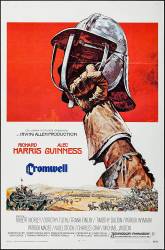Factual error: In the scene where the king attempts to seize the five members from Parliament, Cromwell makes a dramatic refusal to leave and proposes various "Laws" to prevent his arrest. Cromwell was not one of the five members whom the King tried to arrest and no law can come into force until it had been signed by the reigning Monarch anyway.

Cromwell (1970)
Directed by: Ken Hughes
Starring: Richard Harris, Alec Guinness, Robert Morley, Dorothy Tutin
Suggested correction: It's more of a threat than a declaration.
Factual error: Sir Thomas Fairfax was in overall command of the New Model Army at Naseby, not Cromwell. He was in charge of the cavalry on the right wing (the Ironsides).
Factual error: The movie shows that Charles I remained in Oxford until Oliver Cromwell himself arrested him. In reality, Charles fled to Scotland but the Covenanters sold him back to Parliament.
Trivia: After the execution of Charles I / Alec Guiness, Oliver Cromwell / Richard Harris returns to his home. Sitting by the fire, he is consoled by his wife: he can now put the cares and worries of war and politics behind him, and enjoy a quiet life as a country gentleman. This cosy domesticity is rudely interrupted when some of his old colleagues arrive to tell him tell him that he is now needed to run the country. He protests that, as a country gentleman he would be unfit for such a role, but he reluctantly assumes power. In fact, by the time of Charles I's execution Oliver Cromwell was one of the most powerful political figures and military commanders in Britain, and actively continued commanding armies in Ireland, Scotland and England, and involving himself in government. Although rejecting a suggestion that he should be crowned king (after much deliberation), he was quite willing to take the title of 'Lord Protector' and govern England, Scotland, Ireland and Wales until his death in 1658.
President Bradshaw: Sir, you are before a court of law.
Charles I: I see I am before a power.
Oliver Cromwell: Any action against any member of this House is a breach of privilege, and I move that this House declare as public enemies any who lays hands upon its members. I FURTHER MOVE! I further move that any such action against this House be considered a crime against the people and treason against this nation.
Charles I: So be it. Mister Speaker, you will inform the members of this House that their service is no longer required by the nation. This parliament is, by my authority, terminated. Dissolved.
King Charles: Mr. Cromwell, you are impertinent.
Oliver Cromwell: Such issues are beyond good manners, sir. Catholicism is more than a religion. It is a political power. Therefore, I am led to believe there will be no peace in Ireland until the Catholic Church is crushed.
Join the mailing list
Separate from membership, this is to get updates about mistakes in recent releases. Addresses are not passed on to any third party, and are used solely for direct communication from this site. You can unsubscribe at any time.
Check out the mistake & trivia books, on Kindle and in paperback.



